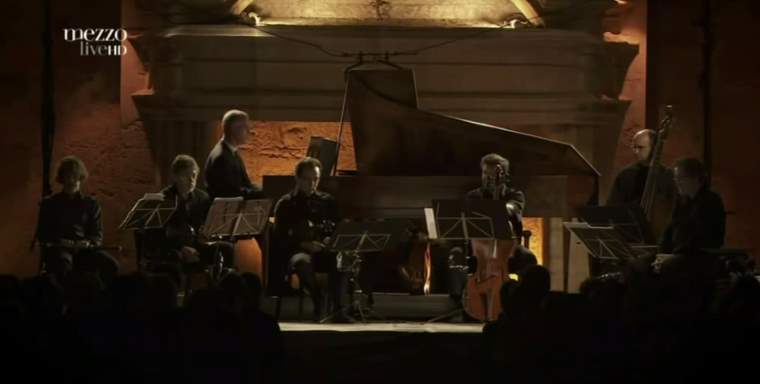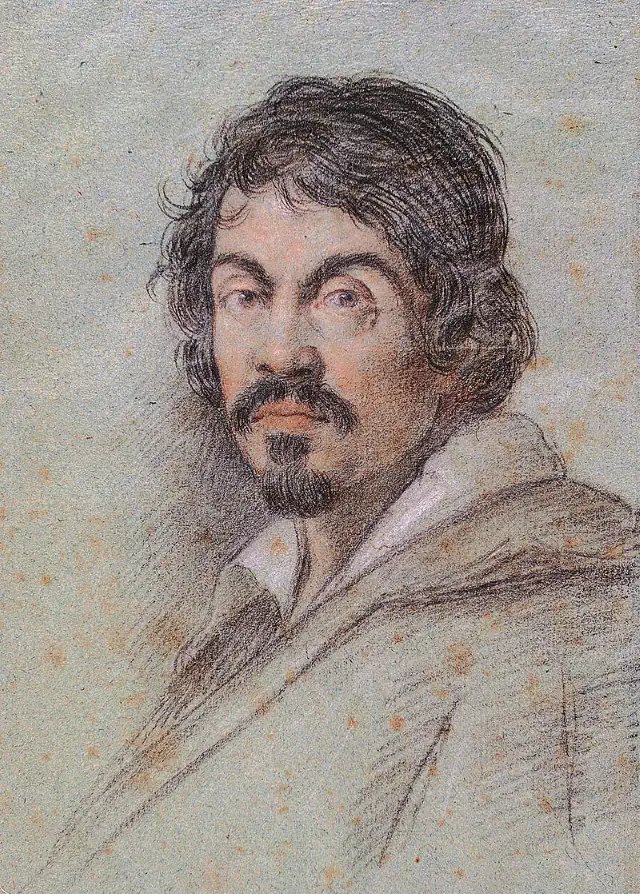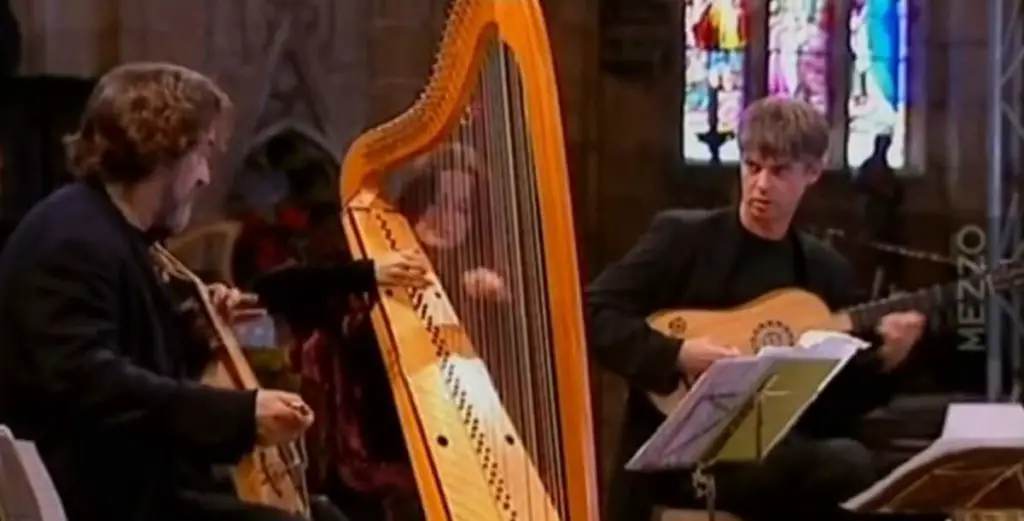A strikingly beautiful performance by Jordi Savall and his ensemble “Le Concert des Nations”, an orchestra with period instruments. Lachrimae Caravaggio – “Caravaggio’s tears”. Pieces from Musical Europe in the time of the Italian painter Michelangelo Merisi da Caravaggio (1571-1610). Recorded during Festival de Maguelone, 2012.
It is a project by Jordi Savall involving musical and verbal illustration of seven paintings by the Renaissance Italian painter Michelangelo Caravaggio (Milan, 29 September 1571 – 18 July? 1610), related to the topic of death. Musical motifs interspersed with texts by the French novelist Dominique Fernandez, approximating the individual works of the painter. Caravaggio’s tears were written for the National Art Museum of Catalonia in Barcelona.
Savall was inspired by a quote from Goethe about painting needs to have its bass continuo and decided to follow it literally. Some of the works are an homage to composers of the period such as Gesualdo (who also killed a man, by the way), Monteverdi, and Trabaci – others are just created in the spirit of the Baroque. All are instrumental except for four short vocal sections by a member of Savall’s family – Ferran Savall.
During the XVI and the XVIII centuries, the ideal work of art was conceived as a combination of painting, music, writing, and sculpture. The most dazzling expressions of this quest for the ideal piece of art were the Opera and the Theatre, where musicians combined their talents with writers, painters, architects, and carvers to materialize a given drama on stage.
Musician Jordi Savall, his collaborators, and Dominique Fernandez have followed the footsteps of this ideal in order to create Lachrimae Caravaggio, an album composed of a set of music pieces and a collection of essays inspired in paintings created by Michaelangelo Merisi (commonly known as Caravaggio) in the XVII century in Italy.
The music featured is a collection of improvisations and versions of works by Monteverdi and other Baroque musicians, although it is not a compilation of specific pieces of Early Music per se: On the one hand, the music follows the conventions and the mysticism of baroque esthetics, but on the other hand, the improvisations and the vocals add a touch of contemporaneous rhythms.
This point is significant as the convergence of both types of music creates a deep and beautiful musical experience that recreates and recalls the contrast between light and shadows present in the work and the life of Caravaggio.
Performers
- Jordi Savall – viola da gamba
- Ferran Savall – voice
- Philippe Pierlot – viola da gamba
- Sergi Casademunt – viola da gamba
- Lorenz Dufschmidt – viola da gamba
- Xavier Puertas – violone
- Xavier Diaz-Latorre – lute, theorbo & guitar
- Perdo Estevan – percussions

Lachrimae Caravaggio Programme
The program is divided into seven “Statios” (stanzas), each representing Savall’s take on seven works by the Renaissance Italian painter Michelangelo Caravaggio.
With the starting times in the video:
- 2:03 Anonymous – Pavana del re
- 3:56 Anonymous – Galliarda la traditora
- 5:37 Jordi Savall – Saltarello
- 7:22 Giovanni M.Trabaci – Durezze E Ligature
- 13:15 John Dowland – Lachrimae Pavan
- 17:06 Orlando Gibbons – In Nomine a 4
- 19:16 William Brade – Ein Schottisch Tanz
- 22:15 Jordi Savall – Passacaglia Libertas
- 25:00 Jordi Savall – Deploratio II
- 27:43 Luys del Milà – Pavana and Gallarda
- 30:47 Joan Cabanilles – Corrente Italiana
- 34:17 Jordi Savall & Dominique Fernandez – Concentus Aria
- 35:36 Jordi Savall & Dominique Fernandez – Concentus Recitativo
- 37:52 Jordi Savall – Folias
- 41:51 Anonymous – Pavane de la Petite Guerre
- 44:06 Anonymous – Bourrée d’avignonez
- 46:27 Consonanze Stravaganti (d’après trabaci)
- 47:57 Jordi Savall – Deploratio III
- 51:14 Samuel Scheidt – Paduan & Courant dolorosa
- 57:56 Jordi Savall – Spiritus Morientis
- 1:00:53 Jordi Savall – Deploratio IV
- 1:05:29 Luigi Rossi – Fantasie “Les Pieurs d`Orphée”
- 1:08:40 Anonymous – Sarabande Italienne
- 1:10:16 Cantus Caravaggio III “In Memoriam”
Caravaggio

Michelangelo Merisi (Michele Angelo Merigi or Amerighi) da Caravaggio, known as simply Caravaggio (29 September 1571 – 18 July 1610), was an Italian Renaissance painter.
Caravaggio’s innovations inspired Baroque painting, but he is also considered the founding father of modern painting. The 20th-century art historian André Berne-Joffroy stated: “What begins in the work of Caravaggio is, quite simply, modern painting.”
Sources
- Caravaggio on Wikipedia
